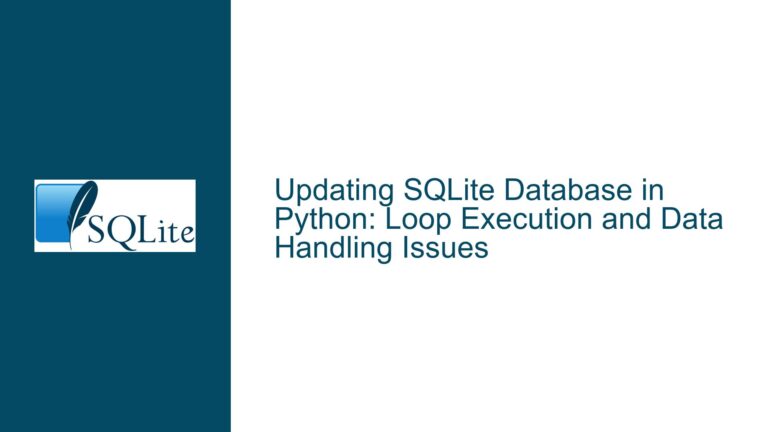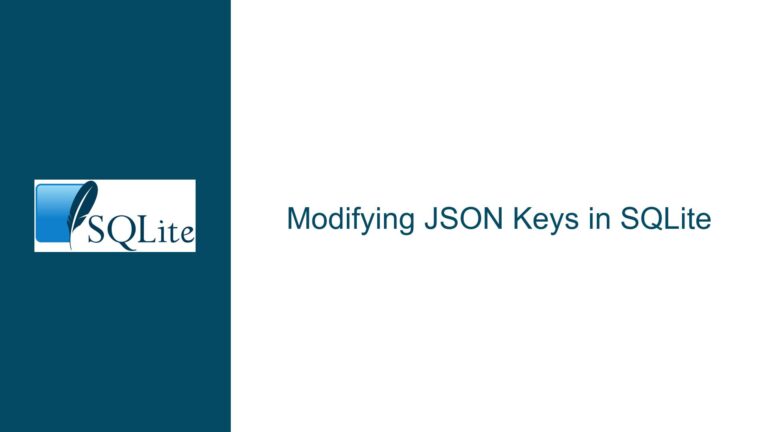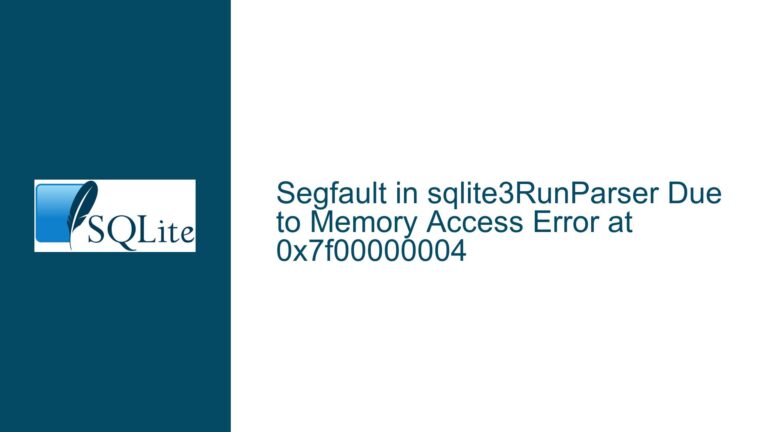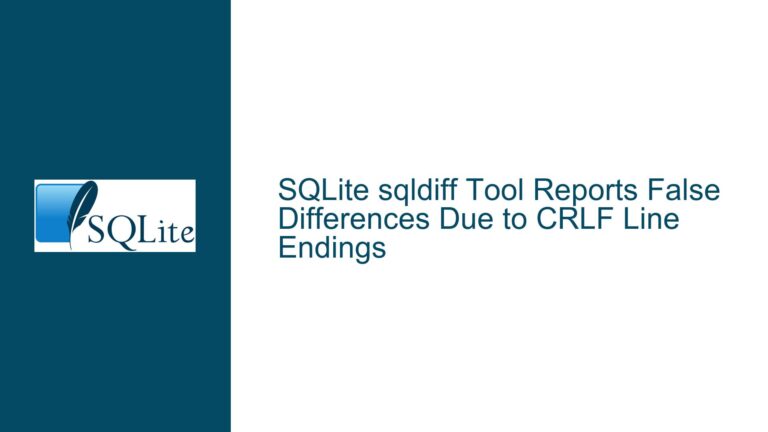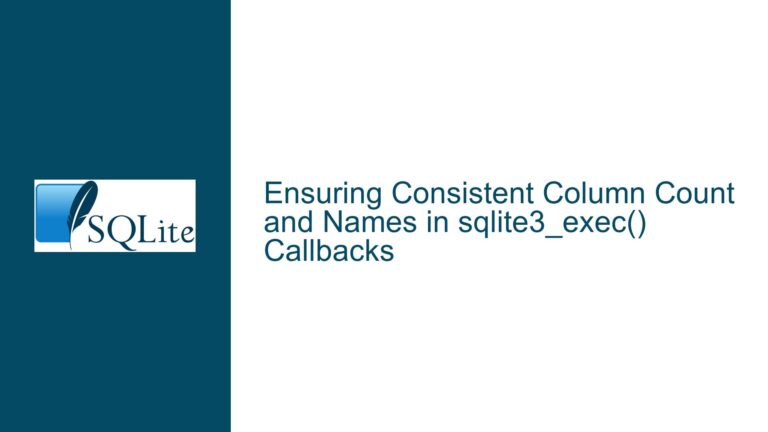Addressing Null Pointer Dereference in SQLite3 with UE5 Plugins and Templated Methods
Issue Overview: Null Pointer Dereference in Templated SQLite3 Methods within UE5 Plugins
When integrating SQLite3 into Unreal Engine 5 (UE5) via custom plugins, developers may encounter a critical runtime error: Exception 0xc0000005 (Access Violation) at address 0x00000000 when invoking methods that use sqlite3_prepare_v3 with C++ templates. The error manifests as a User-Mode Data Execution Prevention (DEP) Violation, indicating an attempt to execute code or access memory at an invalid address. The crash occurs exclusively in templated methods that utilize sqlite3_prepare_v3, but disappears under two conditions:
- If a non-templated method (e.g., one using
sqlite3_get_table) is called first. - If templates are removed from the
sqlite3_prepare_v3wrapper.
This issue is rooted in memory management inconsistencies, temporary object lifetime problems, and database connection lifecycle errors. The crash is triggered by a null pointer dereference, but the underlying causes are multifaceted and involve interactions between UE5’s string conversion utilities, SQLite3’s API usage patterns, and Unreal’s plugin architecture.
Possible Causes: String Encoding, Connection Pooling, and Template Instantiation
1. Dangling Pointers from UE5 String Conversion Macros
The TCHAR_TO_UTF8 macro converts FString (Unreal’s wide-character string) to a UTF-8 const char*. However, the returned pointer is valid only until the end of the current expression. For example:
const char* Path = TCHAR_TO_UTF8(*DBFilePath); // Path becomes invalid after this line
sqlite3_open_v2(Path, ...); // Uses dangling pointer!
This creates a use-after-free scenario where SQLite3 operates on deallocated memory. The problem is exacerbated in templated methods due to delayed template instantiation in C++, which can alter the timing of temporary object destruction.
2. Premature Database Connection Closure
The GetDatabase function opens a new SQLite3 connection every time it’s called. However, the QueryPrepare and Query methods explicitly close the connection with sqlite3_close(Database), violating SQLite3’s thread-safety rules when:
- Multiple threads share the same database handle.
- A closed handle is reused accidentally (e.g., through stale pointers).
This leads to double-free errors or attempts to access invalidated sqlite3* handles. The non-templated Query2 method avoids this by omitting sqlite3_close, which coincidentally prevents the crash.
3. Template-Induced Code Generation Differences
Templated methods like QueryPrepare<T> may generate machine code that interacts differently with UE5’s memory allocator. For example:
- Template instantiation could force stricter alignment requirements.
- UE5’s Hot Reload system might mishandle templated plugin code, leading to function pointer mismatches.
- The
FConverUtil::StmtToStruct<T>helper might corrupt the stack ifThas uninitialized members.
Troubleshooting Steps, Solutions & Fixes
Step 1: Validate String Conversion Lifetimes
Problem: The TCHAR_TO_UTF8 macro returns a temporary object that is destroyed before SQLite3 uses the converted string.
Solution:
// Store the converted string in a persistent variable
FTCHARToUTF8 ConvertedSQL(*SQL);
const char* SQLUtf8 = ConvertedSQL.Get();
sqlite3_prepare_v3(Database, SQLUtf8, -1, ..., &Stmt, nullptr);
Explanation:
FTCHARToUTF8is a UE5 utility class that manages the lifetime of the converted string.ConvertedSQLmust remain in scope for as long asSQLUtf8is used.
Verification:
- Add logging to print the
SQLUtf8pointer address before and aftersqlite3_prepare_v3. - Use Unreal’s Memory Profiler to check for invalid memory accesses.
Step 2: Audit Database Connection Lifecycle Management
Problem: sqlite3_close is called inconsistently, leading to dangling database handles.
Solution:
- Remove all
sqlite3_close(Database)calls fromQueryPrepareandQuery. - Implement a connection pool with explicit open/close methods:
// In USQLite3Manager.h
TMap<int32, sqlite3*> DBPool;
void OpenDatabase(int32 DBKey) {
if (!DBPool.Contains(DBKey)) {
sqlite3* Database;
sqlite3_open_v2(..., &Database);
DBPool.Add(DBKey, Database);
}
}
void CloseDatabase(int32 DBKey) {
if (DBPool.Contains(DBKey)) {
sqlite3_close(DBPool[DBKey]);
DBPool.Remove(DBKey);
}
}
Explanation:
- Centralizes connection management.
- Prevents double-closing and invalid handle reuse.
Verification:
- Log the
sqlite3*handle’s address at open/close. - Check
sqlite3_threadsafe()returns1(Serialized mode).
Step 3: Diagnose Template-Specific Codegen Issues
Problem: Templated methods interact poorly with UE5’s plugin system or SQLite3’s API.
Solution A: Explicit Template Instantiation
Force all template instantiations to occur within the plugin’s compilation unit:
// In SQLite3Manager.cpp
template class USQLite3Manager::QueryPrepare<FSQLite3Test>;
Explanation:
- Ensures template code is generated in the plugin’s context, avoiding linker mismatches.
Solution B: Replace Templates with Macros
Use Unreal’s USTRUCT system for serialization instead of generic templates:
// Replace TArray<T> with a USTRUCT-driven approach
USTRUCT(BlueprintType)
struct FSQLiteRow {
GENERATED_BODY()
TMap<FString, FString> Columns;
};
TArray<FSQLiteRow> QueryPrepare(int32 DBKey, FString SQL);
Explanation:
- Avoids C++ templates, which can conflict with UE5’s reflection system.
Verification:
- Test with
-d2cgsummarycompiler flag to analyze template codegen. - Use Unreal Header Tool (UHT) logs to check for reflection conflicts.
Final Recommendations
- Enable SQLite3 Debug Symbols: Rebuild SQLite3 with
-DSQLITE_DEBUGto get enhanced error messages. - Use UE5’s Memory Guards: Wrap SQLite3 calls with
FMallocTBBguards to detect heap corruption. - Leverage UE5’s Async System: Execute
sqlite3_prepare_v3on a background thread usingAsyncTask.
By systematically addressing string lifetimes, connection pooling, and template instantiation, developers can resolve the DEP violation and ensure robust SQLite3 integration in UE5 plugins.

